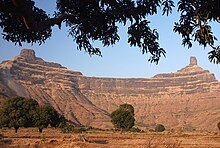Selbari Range
Traditionally, the range is limited to the hills sprawling north of the Mausam River but extended definitions also include those south of the Mosam river which are connected to the former in a semi-circular loop. This shorter southern extension is known as the Dolbhari hills named after a village settlement around their base. To avoid disambiguity, sources refer to this agglomeration as the Selbari-Dholbari range.
Geology
The mountain range was formed by the same historical events that gave birth to the Western Ghats. Resting on the Deccan Plateau geologically identified as a large igneous province, it consists of solidified Flood basalt dating back to the Cenozoic era.
Geography
The peaks progressively lose altitude towards the east, with westernmost peaks being twice as tall as those at the eastern end. East of this hill is situated the Selbari pass facilitating road communication in the depression caused by the headward erosion across this range by the Salvar nala, a tributary of the Panjhra river of Dhule district. Further east are situated the Hindabari pass and Thermal fort. Near the eastern extremity of this range within the district is situated the Galna fort, which has given its name to this line of hills, commanding a pass route from south to north. The western edge falls gently to the Dang region in Gujarat.
List of notable peaks
The Highest list in the Selbari range (excluding Dholbari) is the Mangi-Tungi peak with its higher pinnacle Mangi rising up to 4360 feet. If one includes the Dholbari range then, the tallest peak would be Salher which is also the highest fort and the second highest peak in Maharashtra.


| Name | Elevation in meters |
|---|---|
| Mangi-Tungi | 1,331m |
| Tambolya | 1,078m |
| Nhavi Killa | 1280 |
| Hanumantgad | 1062 |
| Der Kharak | 1099 |
Additional peaks in the Silbari-Dholbari range:
| Name | Elevation in meters |
|---|---|
| Salher | 1,567m |
| Takara | 1,478m |
| Mulher | 1,317m |
| Chauler | 1,137m |
| Galna | 787m |
See also
References
- ^ "NASIK DISTRICT GAZETTEERs". cultural.maharashtra.gov.in. Archived from the original on 25 September 2013. Retrieved 17 January 2022.
- ^ "Mangi-Tungi , Nashik District, Western Ghats, India, Adventure, Trekking". Trekshitiz.com. Retrieved 30 December 2018.